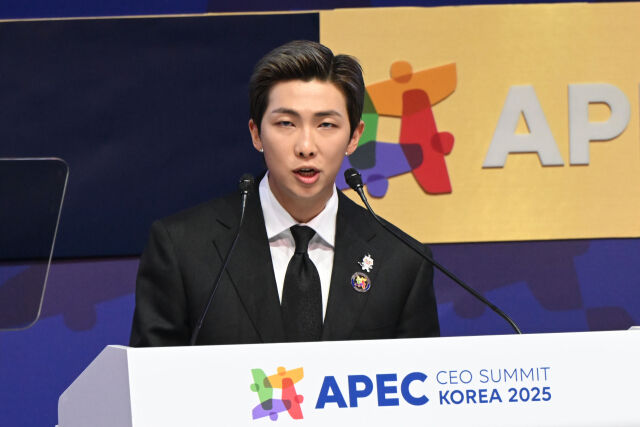
RM, the leader of BTS, delivered a keynote at the APEC CEO Summit in Gyeongju, South Korea, on October 29, becoming the first K-pop artist to take the stage at the high-profile gathering.
Speaking for roughly 10 minutes on “Cultural Industries and K-Culture Soft Power in the APEC Region (from a creator’s perspective),” RM explored what gives K-pop its global pull and unusually inclusive community.
He said the secret lies in a “special principle of fusion,” likening K-pop to bibimbap, a Korean dish where distinct ingredients mix without losing their identity. By embracing Western elements like hip-hop, R&B, and EDM while threading in Korean aesthetics, emotion, and a rigorous production system, K-pop has created something uniquely its own.
“K-pop isn’t just a music genre―it’s a 360-degree package of music, choreography, visuals, and storytelling,” he noted, adding that its rise is “not about cultural superiority but about honoring diversity and welcoming the wider world.”
RM recalled BTS’s early hurdles in the West, where they were often labeled a “non-English act” and faced blunt moments―like being asked if they were from North Korea―before breaking into mainstream media.
He credited BTS’s fanbase, ARMY, as the driving force that helped shatter those barriers. Through music, he said, they built cross-border connection and solidarity, organizing grassroots donations and social campaigns along the way. “ARMY’s borderless inclusivity and powerful unity have fueled my creativity and helped amplify our voice at the U.N. General Assembly, the White House, and now APEC,” he said.
Closing his remarks, RM urged APEC leaders to expand economic support and opportunities for creators worldwide. Because culture and the arts carry messages of diversity and inclusion, he argued, investment in future generations must be considered not only through an economic lens but a cultural one as well.
“Your policies and support can become a canvas―and a playground―for creators across the globe to fully express their ideas,” he said, emphasizing that creative work can turn “difference” into understanding and openness, and build solidarity toward a better future.
BTS previously addressed the U.N. in 2018, when RM delivered a speech as the group launched its “Love Myself” campaign aimed at ending violence against children and young people worldwide.
Photo: Yonhap News
(SBS Entertainment News | Kang Kyung-youn)
